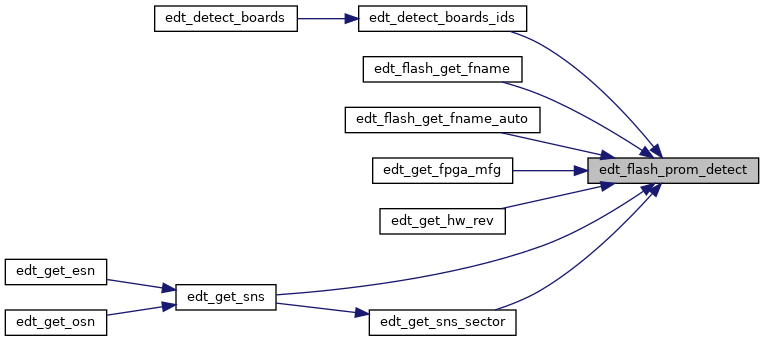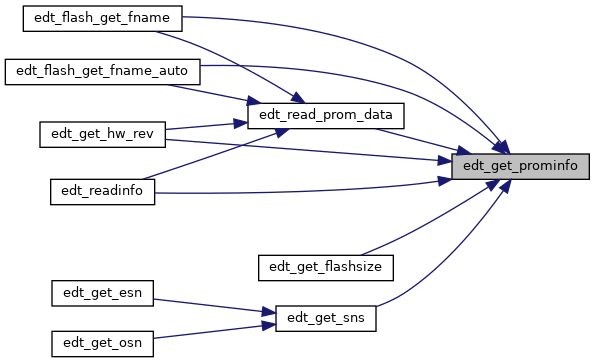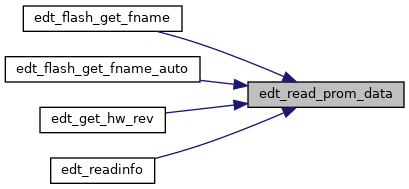|
| int | edt_parse_devinfo (const char *str, Edt_embinfo *ei) |
| | Parse the board's embedded information string. More...
|
| |
| void | edt_get_sns (EdtDev edt_p, char *esn, char *osn) |
| | Retrieve the board's manufacturer and OEM embedded information strings from the PCI Xilinx information header. More...
|
| |
| void | edt_get_sns_sector (EdtDev edt_p, char *esn, char *osn, int sector) |
| | Retrieve the board's manufacturer and OEM embedded information strings from the PCI Xilinx information header. More...
|
| |
| void | edt_get_osn (EdtDev edt_p, char *osn) |
| | Retrieve the board's OEM embedded information string from the PCI Xilinx information header. More...
|
| |
| void | edt_get_esn (EdtDev edt_p, char *esn) |
| | Retrieve the board's EDT embedded information string from the PCI Xilinx information header. More...
|
| |
| char * | edt_fmt_pn (const char *pn, char *pn_str) |
| | Takes a part number portion of the embedded information string, as retrieved from the PCI FPGA information header via edt_get_sns; reformats and returns it in a "human readable" form (dashes added). More...
|
| |
| int | edt_flash_get_fname (EdtDev edt_p, char *name) |
| | Extract the name of the on-board firmware in the device's FPGA PROM, minus the extension. More...
|
| |
| int | edt_flash_get_fname_auto (EdtDev edt_p, char *name) |
| | Extract the name of the on-board firmware in the device's FPGA PROM, minus the version and extension. More...
|
| |
| int | edt_flash_prom_detect (EdtDev edt_p, u_short *stat) |
| | Find the flash prom and flash status (jumper positions) for the device. Finds out which flash PROM is used and queries the device PROM status – see EPinfo stat field for status bits values. More...
|
| |
| u_int | edt_get_flashsize (int promcode) |
| | Get the flash PROM bank size. More...
|
| |
| int | edt_get_max_promcode (void) |
| |
| Edt_prominfo * | edt_get_prominfo (int promcode) |
| | Returns the pciload device information structure for the specific flash PROM code given. More...
|
| |
| const char * | edt_get_fpga_mfg (EdtDev edt_p) |
| | Returns the FPGA manufacturer name string. More...
|
| |
| const char * | edt_flash_type_string (int ftype) |
| | Returns a printable name for FTYPE values. Mainly for debug output. More...
|
| |
| void | edt_readinfo (EdtDev edt_p, int promcode, int sect, char *idstr, char *devinfo, char *oemsn) |
| | Read the board's FPGA configuration file id and serial numbers. More...
|
| |
| void | edt_read_prom_data (EdtDev edt_p, int promcode, int segment, EdtPromData *pdata) |
| | Get the onboard PROM device info as written to unused PROM space by EDT before shipping, or thereafter via -I or -i options to pciload. More...
|
| |
| int | edt_program_flash_start (EdtDev edt_p) |
| |
| void | edt_program_flash_chunk (EdtDev edt_p, const u_char *buf, int xfer, int do_sleep) |
| |
| int | edt_program_flash_end (EdtDev edt_p) |
| |
| int | edt_get_hw_rev (EdtDev edt_p) |
| |
| u_char * | edt_flash_block_read (EdtDev edt_p, u_int addr, u_char *buf, u_int size, int ftype) |
| | Read a string out of the FPGA, of a given size, from a given address. Used for Xilinx ID id string and serial number strings. More...
|
| |
| int edt_parse_devinfo |
( |
const char * |
str, |
|
|
Edt_embinfo * |
ei |
|
) |
| |
Parse the board's embedded information string.
- Parameters
-
| str | An embedded information string, from edt_get_esn, etc. |
| [out] | ei | Edt_embinfo structure into which the the parsed information will be put. |
- Returns
- 0 on success, -1 on error (input string not valid or too long).
- See also
- edt_readinfo, edt_get_esn, edt_fmt_pn
During manufacturing programming, EDT embeds selected information is embedded into an unused area of the FPGA PROM. This information is preserved across reloads (via pciload, hubload, etc.) unless options to overwrite are invoked in one of those utilities. This subroutine takes as an argument the full information string, as retrieved from edt_get_esn, edt_get_osn or edt_get_sns, into the fields indicated by the Edt_embinfo structure.
(To see the information string, run pciload with no arguments.)
- Note
- Information embedding was implemented in Sept. 2004; boards shipped before that time will yield a string with all NULLS unless the board's FPGA has since been updated with the embedded information.
| void edt_get_sns_sector |
( |
EdtDev |
edt_p, |
|
|
char * |
esn, |
|
|
char * |
osn, |
|
|
int |
sector |
|
) |
| |
Retrieve the board's manufacturer and OEM embedded information strings from the PCI Xilinx information header.
- Parameters
-
| edt_p | The EDT open device handle. |
| esn | A buffer of size ESN_SIZE or larger to receive the EDT information string. |
| osn | A buffer of size OSN_SIZE or larger to receive the OEM information string. |
| sector | Which sector of the PROM to retreive data from. |
- See also
- edt_get_esn, edt_get_osn, edt_get_sns, edt_parse_devinfo, edt_fmt_pn
Certain information about the board, including manufacturer's part number, serial number, clock speed, Xilinx FPGA, and options, is embedded in an unused area of the Xilinx FPGA PROM at the time of manufacture. This information is preserved across reloads (via pciload, hubload, etc.) unless options overwrite are invoked in the utility. This subroutine retrieves EDT and OEM (if present) information. The data is an ASCII string, with the following colon-separated fields:
serial number:part number:clock speed:options:revision:interface xilinx:
(To see the information string, run pciload with no arguments.)
- Note
- Information embedding was implemented in Sept. 2004; boards shipped before that time will yield a string with all NULLS unless the board's FPGA has since been updated with the embedded information.
| void edt_get_esn |
( |
EdtDev |
edt_p, |
|
|
char * |
esn |
|
) |
| |
Retrieve the board's EDT embedded information string from the PCI Xilinx information header.
- Parameters
-
| edt_p | The EDT open device handle. |
| [out] | esn | A buffer of size ESN_SIZE or larger to receive the information string. |
- See also
- edt_get_sns, edt_get_osn, edt_parse_devinfo, edt_fmt_pn
The EDT information string is embedded in an unused area of the Xilinx FPGA PROM, and is preserved across reloads (via pciload, hubload, etc.) unless options to overwrite are invoked in one of those utilities.
The data is an ASCII string, with the following colon-separated fields:
serial number:part number:clock speed:options:revision:interface xilinx:macaddrs:
(To see the information string, run pciload with no arguments.)
- Note
- Information embedding was implemented in Sept. 2004; boards shipped before that time will yield a string with all NULLS unless the board's FPGA has since been updated with the embedded information.
| int edt_flash_get_fname |
( |
EdtDev |
edt_p, |
|
|
char * |
name |
|
) |
| |
Extract the name of the on-board firmware in the device's FPGA PROM, minus the extension.
- Parameters
-
| edt_p | The EDT open device handle. |
| [out] | name | A buffer of size PCI_ID_SIZE or larger to receive the FPGA filename. |
- See also
- edt_flash_get_fname_auto
Fills in the name string field with the name of the device's onboard PROM, minus the voltage descriptor if any, and extension (.ncd). For devices with two voltage sectors to the firmware, two files with _3v.ncd and _5v.ncd extensions will be present; in such cases the _3v and _5v will be stripped off as well. For example if the device is loaded with "pcidev-10_3v.ncd" and "pcidev-10_5v.ncd", the subroutine will return "pcidev-10".
| int edt_flash_get_fname_auto |
( |
EdtDev |
edt_p, |
|
|
char * |
name |
|
) |
| |
Extract the name of the on-board firmware in the device's FPGA PROM, minus the version and extension.
- Parameters
-
| edt_p | The EDT open device handle. |
| [out] | name | A buffer of size PCI_ID_SIZE or larger to receive the FPGA filename. |
- See also
- edt_flash_get_fname
Fills in the name string field with the name of the device's onboard PROM, minus the version, voltage descriptor if any, and extension (.ncd). For devices with two voltage sectors to the firmware, two files with _3v.ncd and _5v.ncd extensions will be present; in such cases _3v and _5v will be stripped off as well. For example if the device is loaded with "pcidev-10_3v.ncd" and "pcidev-10_5v.ncd", the subroutine will return "pcidev".


















